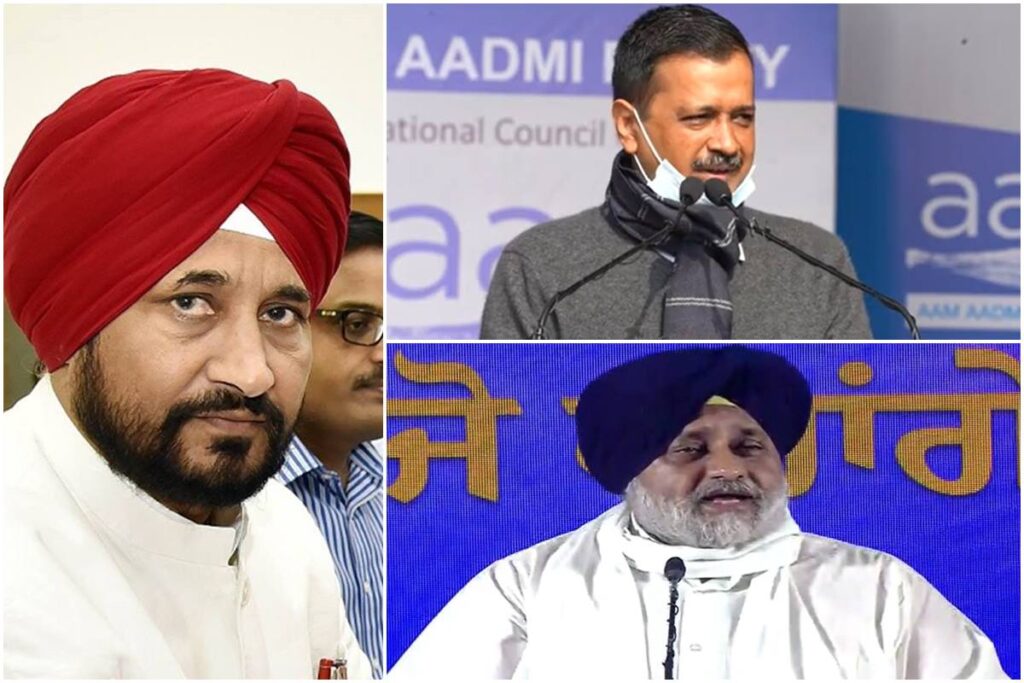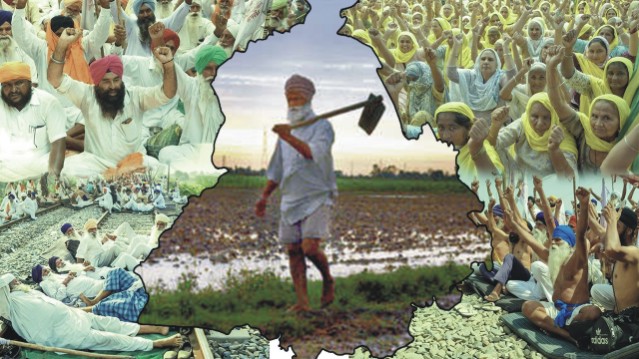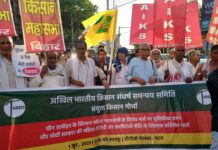The political core of the historic Farmers’ Movement was anti-corporate. Tens of thousands of farmers had camped outside Delhi, demanding the withdrawal of the three Farm Laws stating that the laws were designed to allow billionaires such as Mukesh Ambani and Gautam Adani to enter and control farming. Yet, in the assembly elections campaign in Punjab, all the mainstream political parties in the state are silent on this issue.
Punjab’s 117 assembly seats will go to the polls on February 20. The state heads into polling in an atmosphere of deep discontent stemming from an aggravating agrarian crisis to massive unemployment, corruption and mafia raj. The people of Punjab, it seems, are looking for a change, and in the absence of a credible political force, Arvind Kejriwal’s Aam Aadmi Party (AAP) has emerged as a key challenger to the Congress and Akali Dal’s traditional monopoly over power in the state. Propelled by a ‘no progress without change’ sentiment among the people, the Aam Aadmi Party (AAP) poses a serious threat to the incumbent Congress. While the result will be known on 10 March, many analysts and opinion polls are giving AAP a majority.
In the intense campaign in the run up to the election, the prominent leaders of the main political parties in fray, are competing with each other in announcing freebies like electricity, water, monthly allowance to women, loan interest waiver to farmers etc. The Congress High Command, sensing the people’s disillusionment with Captain Amrinder’s misrule and to stop the intense factional infighting between the Captain and Navjot Sidhu, which at one point threatened to split the Congress, appointed Charanjit Singh Channi as the CM replacing Amrinder Singh. The Congress has projected Channi, a Dalit, as its chief minister candidate. Rahul Gandhi while campaigning in the state has stressed on Channi’s humble and poor roots.

To neutralize the Dalit-face advantage of Congress, all the parties are wooing the Dalits, who comprise 32 percent of the state’s population. The Shiromani Akali Dal (SAD) fighting the election in alliance with Mayabati’s Bahujan Samaj Party (BSP) has promised to pick a person from the Dalit community as deputy chief minister if voted to power in the state. SAD is highlighting the failures of the Congress government, and being a regional party, is stressing on the issue of federalism. The BJP while raking up the bogey of nationalism, too has announced to make a Dalit the CM of the state if it is elected to power. Prime Minister Narendra Modi in campaign speeches in the state, in his favorite usual style, attacked the Nehru-Gandhi family and held them responsible for all the present problems of the country. The anti-Channi or the Jat Sikh faction of the Congress are talking of the ’Sidhu Model’ of providing a corruption free clean government in the state by eradicating the sand, cable and drug mafia. The Aam Aadmi Party has made the need for a ‘change’ in Punjab, a focal point of its campaign, and is highlighting Arvind Kejriwal’s ‘Delhi Model’ of good governance. In a state already under massive debt, the parties are competing to lure the voters with further concessions, while the real economic issues of concern to the masses, the agrarian distress and creation of jobs outside the agriculture sector, have remained unaddressed.
The Assembly elections in Punjab are happening in a little over a month after the farmers’ movement at Delhi borders. The more than year-long movement led by the farmers’ organizations in the state and supported by every section of Punjabi society forced Narendra Modi to take back the three Farm Laws. The victory of the farmers was not only the first significant defeat of the Modi-regime but also a big setback for the corporates, both domestic and foriegn, eyeing to penetrate the Indian Agricultural sector and control the production, marketing and consumption of agri-products. For the first time in India’s history of mass movement, the farmers’ of Punjab made the corporates — Adani and Reliance — the direct target of their agitation. At that time all the political parties in Punjab agreed with the farmer’s stance that the three laws were meant to facilitate corporate takeover and control of agriculture. Even Rahul Gandhi, during his visit to the state, said that the Modi government is a puppet of the corporate houses and was serving their interest. But sadly, none of the parties, in their election campaign or Manifestos, have uttered a single word against the Corporates. There is no mention of combating the corporate takeover of agriculture in Punjab. The root of all the economic problems in the country lies in the neoliberal model of handing over every productive resource to the crony capitalists.

The economy is mainly divided into three sectors — agriculture, industry, and services. Corporate control is much more predominant in industries and services. Even in the agricultural sector, the inputs used are produced by the corporates. If we look at the model of the Green Revolution, we will find that the corporates increased their control over agriculture through the use of fertilizers, pesticides, insecticides, hybrid seeds, modern machinery and technology. The sudden increase in agricultural production at that time had also increased the income of the farmers. As a result, a large number of people and policy makers ignored the future negative effects of this model of agriculture. Today in Punjab, the agriculture sector faces problems like debt, suicide and exit of small farmers from agriculture. In addition to this, the Green Revolution has led to alarmingly low underground water table, toxic chemical pollution of land and water bodies, loss of soil fertility etc. Even at that time neither the political parties nor the policy makers opposed the dominance of corporate over agriculture through the model of Green Revolution. Today, when we look at the three repealed laws, it is clear that while the Green Revolution model only led to corporate control of agricultural inputs (fertilizers, seeds, machinery etc.), these three agricultural laws, in addition to inputs, would also ensure corporate control of crop output.
The world economy is going through a crisis of stagnation. The rate of growth in manufacturing is declining. There is stagnation in the services sector also. The corporate world is seeing great potential for investment in the agricultural sector, both in food production and its marketing. In fact, governments are in favour of corporate farming, in which companies will farm on a large scale, introduce digitization and robotization through use of artificial intelligence in the sector. With this kind of technology intensive farming gaining ground, the farmers will be pushed out and their land will go in the hands of the companies. While small and marginal farmers will be converted into wage labourers, even the big farmers will be compelled to go for contract farming or rent their land to the companies. In fact, due to the huge pressure from the corporate world, all the political parties are preparing their election manifestos in favour of corporates in the name of bringing development to Punjab.
Continued in Part-2. It can be read here.
The author is Principal Economist, Punjab Agricultural University, Ludhiana. Views are personal.





























